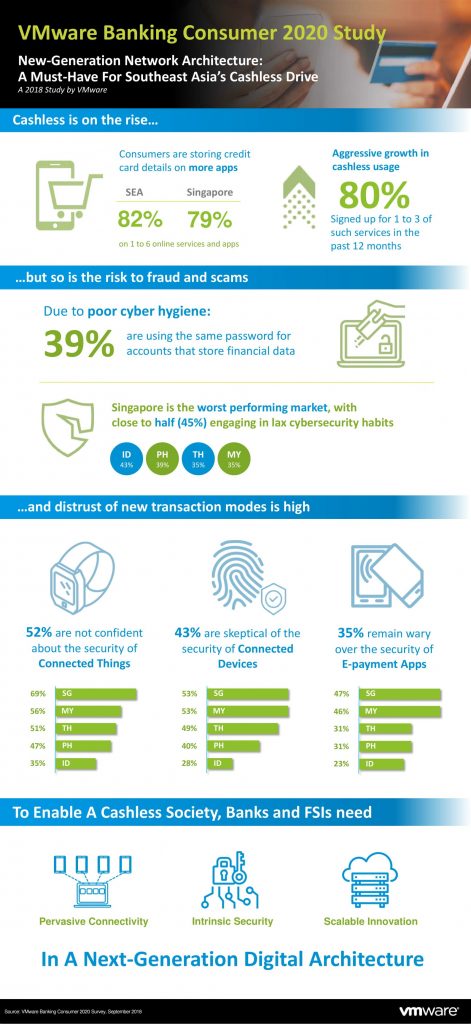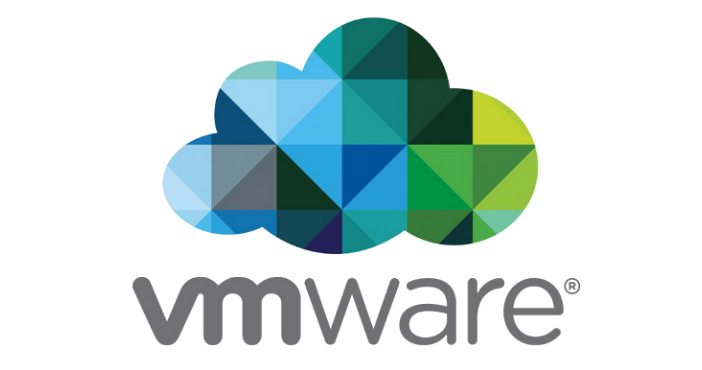MAS recently issued a set of guidelines aimed at protecting users of e-payment platforms from fraud, highlighting the financial and cybersecurity risks involved in Singapore’s cashless drive.
With Singapore’s strong push to go cashless and the recent launch of the unified SGQR code for e-payments, the digital wallet and e-payment landscape in Singapore is set for growth. However, VMware’s new Banking Consumer 2020 study reveals that:
- 45% of Singapore respondents use the same password and login for some to all of their online accounts that contain payment data
- 76% store bank account details on between 1 – 6 apps
- Only 14% of Singaporeans use different passwords for all their accounts à the lowest in Southeast Asia
- Despite greater adoption of e-payment options, Singaporeans still harbor distrust for online payment security
- As next-generation payment technologies go mainstream, there is a greater risk of fraud and a pressing need to boost the cybersecurity defenses of banks and FSIs.
VMware: Distrust of Online Payment Security and Poor Cyber Hygiene Major Hurdles to Singapore’s Cashless Drive
- Widening gap between cashless uptake and lax consumer cybersecurity habits threatens businesses and economy with greater risk of financial fraud and economic losses
- Innovation needs to rest on a robust network architecture built on speed, intelligence and ‘zero trust,’ urges VMware as it announces its networking vision and next-
generation architecture built with pervasive connectivity, intrinsic security for hyperdistributed apps and data, regardless of cloud environment
SINGAPORE – October 4, 2018 – According to VMware, Inc. (NYSE: VMW), a leading innovator in enterprise software. The new VMware Banking 2020 Study reveals that nearly half (45%) of those surveyed, the highest in Southeast Asia, do not take proper measures to secure their financial data, and use the same passwords for some to all of the services and apps that contain personal payment data.
While the increasing uptake in cashless payments are encouraging signs for Singapore’s cashless ambitions, poor cyber hygiene practices could put consumers, banks and financial institutions (FSIs) at greater risk of financial fraud and losses. 76% of Singapore consumers surveyed store their bank account details on at least one to six applications, yet only a handful (14%) are practicing good cybersecurity practices by using different passwords for all their accounts, making Singapore the country with the least cyber hygiene of those surveyed in the region, as Thailand takes the lead at 30%.
“With Singapore expected to be 82% cashless by 2022, according to Frost & Sullivan’s Future of Cashless Payment in Singapore 2018 report[1], banks and FSIs have a pressing need to boost their cybersecurity defenses,” said Sanjay K. Deshmukh, Vice President and Managing Director, Southeast Asia and Korea, VMware. “Existing architecture is insufficient to guard against this new payment reality – banks and FSIs need a new network infrastructure to protect their apps, data and users across multiple cloud environments.”
The study also found that Singapore consumers are more skeptical towards the level of security afforded by new payment methods than their counterparts in other countries in the region, preferring the security of traditional payment methods such as cash and ATMs which means banks and FSIs need to do more to give consumers peace of mind. In contrast, consumers in Indonesia, the Philippines and Thailand place greater trust in connected things as new methods of payment.
In order to further secure online payment platforms, banks and FSIs continue to innovate to meet the shifting demands of mobile-first consumers. Forward-thinking banks are already gaining traction with the introduction of biometric payment with at least three quarters of consumers in the region placing high trust in the technology, alongside cash payment.
Singapore consumers also indicated areas of improvement for banks to do better in, rating these attributes lower than the regional average:
- Transparency in policies and understandable terms and conditions;
- Data privacy security and ethical use of personal data;
- Speed in answering queries or resolving issues;
- Availability of customer service channels.
VMware Powers Digital Transformation with Virtual Cloud Networking: Advances Networking and Security for All Workloads on Any Cloud
To help banks and FSIs strike a balance between innovation and scalability, VMware announced new advancements to help customers implement a more secure, end-to-end software-based network architecture, a Virtual Cloud Network, that will enable pervasive connectivity and intrinsic security for hyper-distributed apps and data, regardless of cloud environment. Banks, FSIs and businesses that put agility, innovation and security at the core stand to benefit from the VCN by unlocking value from current networking technologies, significantly reducing network complexity, and redefining network security.
Advancing Networking and Security for All Workloads on Any Cloud: VMware NSX-T Data Center 2.3 extends advanced multi-cloud networking and security capabilities. This pervasive connectivity, independent of the underlying cloud, empowers customers that operate across multiple public clouds to take advantage of local availability zones and the unique services of different cloud providers.
Simplifying NSX Deployment, Management, and Use: VMware NSX-T Data Center 2.3 will simplify installation, configuration, and management with new deployment workflows and search functionality for objects and events. This will enable administrators to express policies in a declarative fashion which will applied to data center and multi-cloud infrastructure.
Security Planning and Self-Driving Operations for a Virtual Cloud Network: This helps customers build and run an optimized, highly-available, and more secure infrastructure for virtual cloud networking. Customers can accelerate micro-segmentation planning and deployment, plan application migration, gain operational views to manage, scale, and enforce compliance for VMware NSX data center deployments. This solution is available as both onpremises software and as a SaaS offering with full feature and scale parity across both.
VMware and Arista Bridge Physical and Virtual Security Across the Virtual Cloud Network: Arista and VMware have collaborated to drive tight interoperability between Arista CloudVision and VMware NSX.
“Banks and FSIs face increased scrutiny over how personal data is handled, and an unyielding demand for fast response to consumers. Finding the right balance between staying attuned to consumers’ needs in compliance and security, while future-proofing their digital foundation with innovation, can be tricky but critical, especially when we are turning to technologies of the future. A Virtual Cloud Network architecture that harnesses the power of networking technologies will empower banks and FSIs to respond faster to new opportunities and threats, create new business models, and deliver services to all applications and data, wherever they are located,” Deshmukh explained.
“VMware is committed to helping our customers and partners embrace digital transformation in this time of disruptive change. As the region embarks on its journey to becoming smart cities and nations with next-generation technologies, establishing a highly secured infrastructure will be mission-critical for verticals such as banks and FSIs,” added Deshmukh. “We continue to help businesses master multi-cloud complexity and bridge the divide between IT operations and developers.”
###
About VMware
VMware software powers the world’s complex digital infrastructure. The company’s compute, cloud, mobility, networking and security offerings provide a dynamic and efficient digital foundation to over 500,000 customers globally, aided by an ecosystem of 75,000 partners. Headquartered in Palo Alto, California, this year VMware celebrates twenty years of breakthrough innovation benefiting business and society. For more information, please visit https://www.vmware.com/company.html.
VMware, NSX and NSX-T Data Center are registered trademarks or trademarks of VMware, Inc. or its subsidiaries in the United States and other jurisdictions. This article may contain hyperlinks to nonVMware websites that are created and maintained by third parties who are solely responsible for the content on such websites.
About VMware Banking Consumer 2020
VMware Banking Consumer 2020 is a regional multi-country study conducted in September 2018, surveying the behaviors, preferences and attitudes towards banking and the future of payments of 6,000 consumers in Indonesia, Malaysia, Singapore, the Philippines, Thailand and South Korea.
[1] Frost & Sullivan, Future of Cashless Payment in Singapore 2018, 2018







